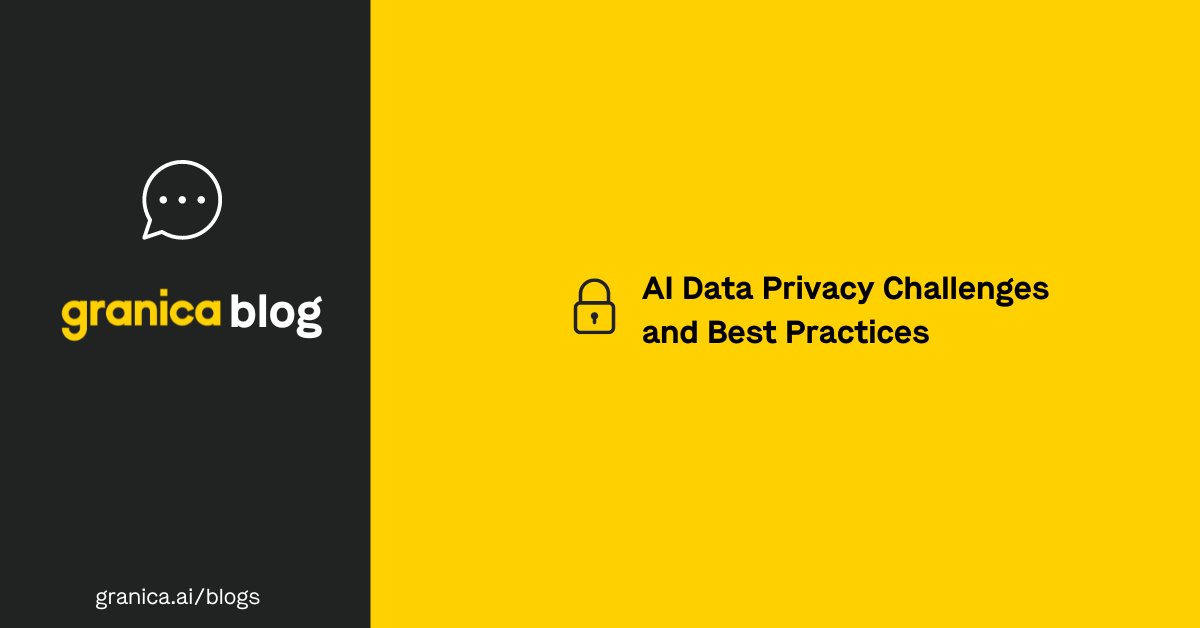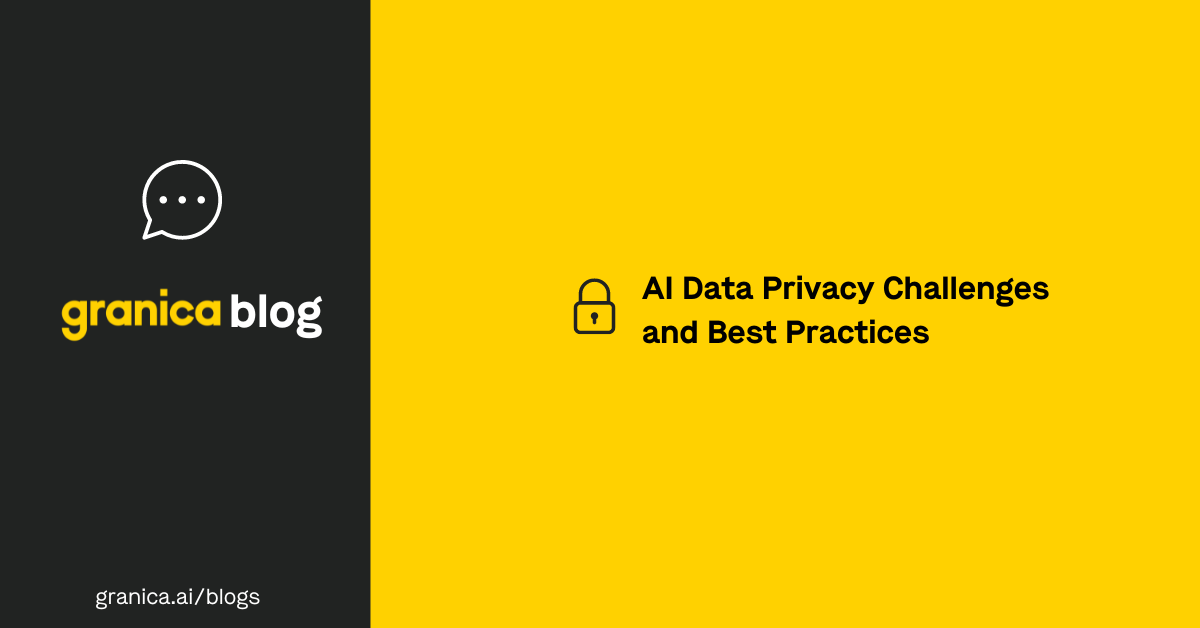
Artificial intelligence technology continues to proliferate at a breathtaking pace, creating new and more complicated data privacy challenges. Large language models (LLMs), generative AI projects, and DSML (data science and machine learning) platforms ingest vast quantities of potentially sensitive data like personally identifiable information (PII) and confidential company details that could be used without consent.
Lawmakers are imposing greater restrictions on how data can be used for AI training and operation, causing regulatory headaches for tech innovators who develop or use this technology. These restrictions, and the policies and tools for maintaining compliance, may also impact downstream AI workload efficiency.
Clear, comprehensive data privacy policies that can adapt to a shifting compliance landscape can mitigate AI data privacy challenges. In addition, leveraging an AI-powered data screening service helps streamline compliance and diminish effects on quality and efficiency. Below, we analyze some of the biggest AI data privacy challenges before discussing solutions that employ industry best practices.
| Table of Contents |
|---|
Use the links above to jump to different sections on this page.
AI data privacy challenges
| Issue | Details |
|---|---|
| Sensitive information in private data | LLMs, generative AI, DSML platforms, and other tools powered by artificial intelligence technology often work with private data that can include PII and other sensitive information. |
| Data privacy regulations | The sheer volume of data - coupled with how often users volunteer restricted data to AI tools - increases the challenge of complying with data privacy regulations like the GDPR and CCPA as well as new AI-related directives like the EU’s AI Act and the US’s HTI-1 rule. |
| Effects on effectiveness and business outcomes | Data privacy policies and tools can decelerate AI initiatives, leading to worse results while driving up costs and negatively impacting ROI. |
Sensitive information in private data
Many companies use LLMs and other AI technology to work with potentially sensitive information. Sometimes, employees input confidential business information into public GenAI tools like ChatGPT to create customer-facing presentations or internal financial reports. Even if all sensitive information is scrubbed from the final product, the private data remains within the LLM, where it could be unintentionally leaked by the AI to other users or intentionally stolen in a hack, exposing company or client secrets. Companies using a customized OSS LLM tool like Mixtral or an enterprise GenAI solution like Scale AI face similar risks when working with sensitive and regulated data.
Even when the data itself isn’t sensitive, AI’s ability to extrapolate new information creates the potential to infer more identifiable characteristics, like a person’s location or online habits. The presence of PII and other sensitive information within AI data makes compliance significantly more challenging. It also increases the risk of leaks, theft, or unwarranted surveillance.
Data privacy regulations
AI’s enormous appetite for data makes it difficult for companies to adhere to privacy regulations that dictate how personal data can be used and by whom. Policies like the General Data Protection Regulation (GDPR) in the EU and European Economic Area, and the California Consumer Privacy Act (CCPA) in the US, grant users extensive privacy rights. They require transparent company policies about how and why they use consumer data and outline stringent security and governance standards.
In addition, lawmakers are specifically targeting artificial intelligence in recent policy initiatives, like the recent White House Executive Order calling for cross-sector consumer protections, the EU’s new AI Act, and the US Department of Health and Human Services’ Health Data, Technology, and Interoperability (HTI-1) rule establishing transparency requirements for AI and predictive algorithms used in health IT.
As privacy laws continue to evolve, companies must work proactively to shore up their policies on data governance, security, and privacy and to prevent regulatory headaches without delaying technological innovation.
Effects on effectiveness and business outcomes
The policies and tools companies use to solve AI data privacy challenges can create issues of their own. Limiting the flow of training data – either by preventing the collection of certain kinds of data or removing sensitive information from existing training datasets – could potentially decelerate AI training projects, delay product releases, or reduce solution effectiveness.
While data privacy screening software can automatically find and remove sensitive information from AI datasets, the process is not instantaneous. Scanning new data takes some time and frequently results in false positives, which also reduces the speed, accuracy, and efficiency of downstream workflows. Furthermore, such solutions are highly compute-intensive, which makes them too expensive to use on large-scale unstructured datasets.
AI data privacy best practices
| Step | Goal |
|---|---|
|
Members are responsible for staying updated on privacy laws, regulations, and industry standards and disseminating relevant information to necessary stakeholders. |
|
Shows companies where data is, how sensitive it is, who has access, and what controls are needed to protect it. |
|
Fosters an ethical corporate culture that prioritizes privacy, welcomes feedback, and cultivates open communication. |
|
Helps companies evaluate the potential data privacy risks involved in adopting new AI technologies. |
|
Mitigate privacy and compliance risks without reducing downstream effectiveness or driving up costs. |
Companies that develop and use artificial intelligence technologies can overcome these challenges by following industry best practices to protect AI data privacy.
Establish an AI data privacy and compliance team
Any organization invested in AI and DSML should prioritize forming a specialized team that’s responsible for staying on top of privacy laws, regulations, and industry standards and disseminating relevant information to necessary stakeholders. In addition to one or more legal experts, your team should include someone involved in the day-to-day development or operation of artificial intelligence technology and who’s familiar with exactly how data is being used and protected.
Specific laws and regulations will vary depending on a company’s location and the type of data used. There are several highly respected organizations dedicated to establishing AI data privacy and protection standards that companies can use as a framework for maintaining compliance across the board and adapting to changing regulations. These include:
- The Partnership on AI (PAI)
- The IEEE Global Initiative on Ethics of Autonomous and Intelligent Systems
- The United Nations Multistakeholder Advisory Body on Artificial Intelligence
Gain complete data visibility
Companies can’t protect what they can’t see. Before privacy and security controls are implemented, it’s important to gain a complete understanding of where data resides both within and outside of the business network, how sensitive or valuable the data is, who currently has access to it, who needs access, and what policies and tools are needed to keep it private.
Data discovery and classification tools help teams find company data and tag it according to business category and sensitivity. Data loss prevention (DLP) solutions monitor sensitive data for unauthorized access, destruction, or exfiltration. Other AI data visibility solutions provide insights into which data is most valuable for training, how to reduce data storage costs, and where and how AI uses data across the organization.
Create clear AI data privacy and governance policies
Companies that create clear, comprehensive policies detailing how data is collected, identified, accessed, and utilized for AI demonstrate their prioritization of data privacy. For example, employees need specific guidelines telling them what information they can and can’t input into GenAI tools based on applicable regulations and business concerns. There should also be a clearly defined process for requesting approval to work with sensitive data and reporting potential privacy breaches.
Conducting frequent, targeted employee training is also recommended to ensure that everyone understands the importance of privacy and knows how to follow your internal policies. To ensure staff members feel comfortable reporting data privacy concerns without fear of reprisals, it’s critical to foster an ethical corporate culture that welcomes feedback and cultivates open communication.
Conduct privacy impact assessments (PIAs)
A PIA provides the opportunity to evaluate the potential data privacy risks involved with implementing a new solution. When considering an LLM or other AI tool, it’s important to consider how it collects, stores, processes, shares, and protects sensitive data. Does it meet internal & regulatory privacy standards? Does it interoperate with the company’s chosen data visibility, privacy, and security solutions?
Leverage advanced data privacy tools
Artificial intelligence can, paradoxically, help solve some of the same data privacy challenges it creates. For example, AI-powered data screening tools detect sensitive information more quickly and accurately than traditional systems, mitigating privacy and compliance risks without reducing efficiency. Advanced AI data privacy tools can process data rapidly and help companies adapt to shifting laws and regulations with greater agility.
As artificial intelligence transforms businesses across every industry, data privacy and compliance grow increasingly complicated. Following best practices established by esteemed organizations like the IEEE can help companies stay ahead of a rapidly evolving regulatory landscape. In addition, advanced tools like Granica Screen can simplify AI data privacy and compliance without hindering downstream workload efficiency.
How Granica streamlines AI data privacy
Granica Screen is a data privacy service for traditional and generative AI. Granica Screen integrates into your cloud environment, where it discovers and masks sensitive information in structured, semi-structured, and unstructured AI training datasets in cloud data lakes as well as in LLM prompts. It streamlines AI data privacy by:
- Offering best-in-class detection accuracy with high precision to reduce false positives.
- Lowering the cost to scan data by 5-10x with high compute efficiency.
- Protecting new, incoming data as it’s written, reducing delays and breach risks.
When used in conjunction with other industry best practices, Granica Screen allows you to safely leverage valuable data containing sensitive information and PII more efficiently by streamlining AI data privacy and compliance.
Sign up for a free demo of Granica Screen to learn how you can build safer, better AI and DSML by preserving data privacy.
Sources:
- https://www.reuters.com/legal/legalindustry/privacy-paradox-with-ai-2023-10-31/
- https://blog.google/technology/ai/google-checks-data-privacy-ai-update/
- https://partnershiponai.org/
- https://standards.ieee.org/industry-connections/ec/autonomous-systems/
- https://www.un.org/techenvoy/content/artificial-intelligence
